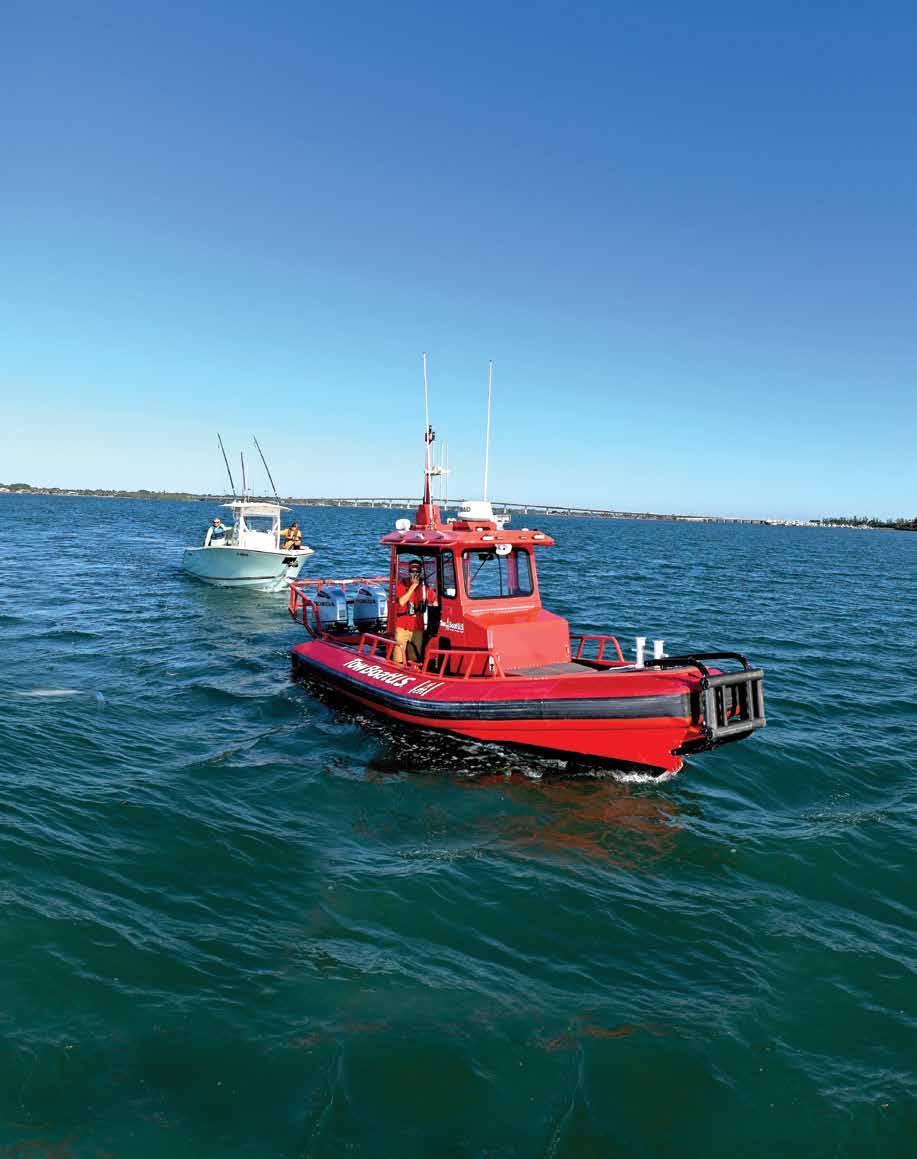WHO HAS THE COOLEST BOAT TOYS?
YOU SHOULD

WHO HAS THE COOLEST BOAT TOYS?
YOU SHOULD
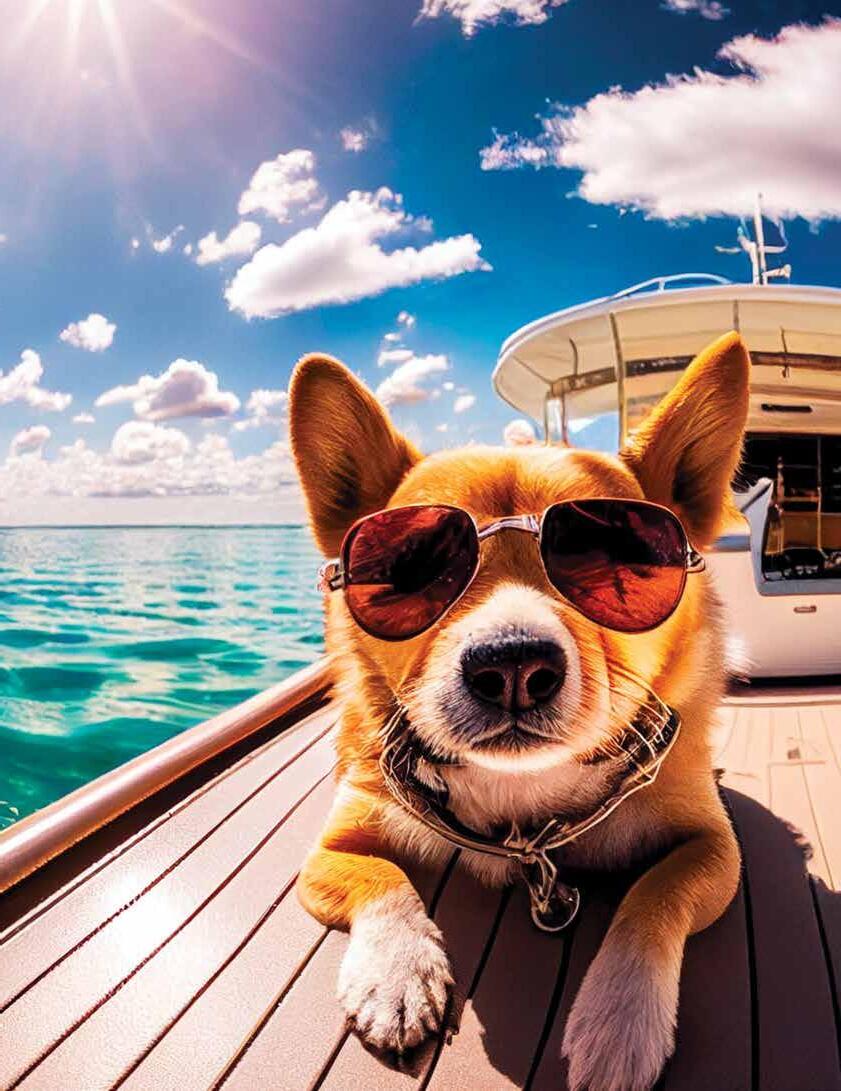
JUST AROUND THE CORNER
KEEP YOUR EYES PEELED
TO SAVE A SEA TURTLE
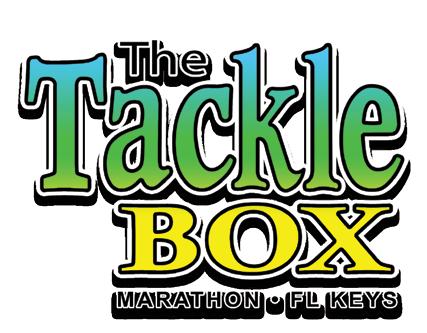





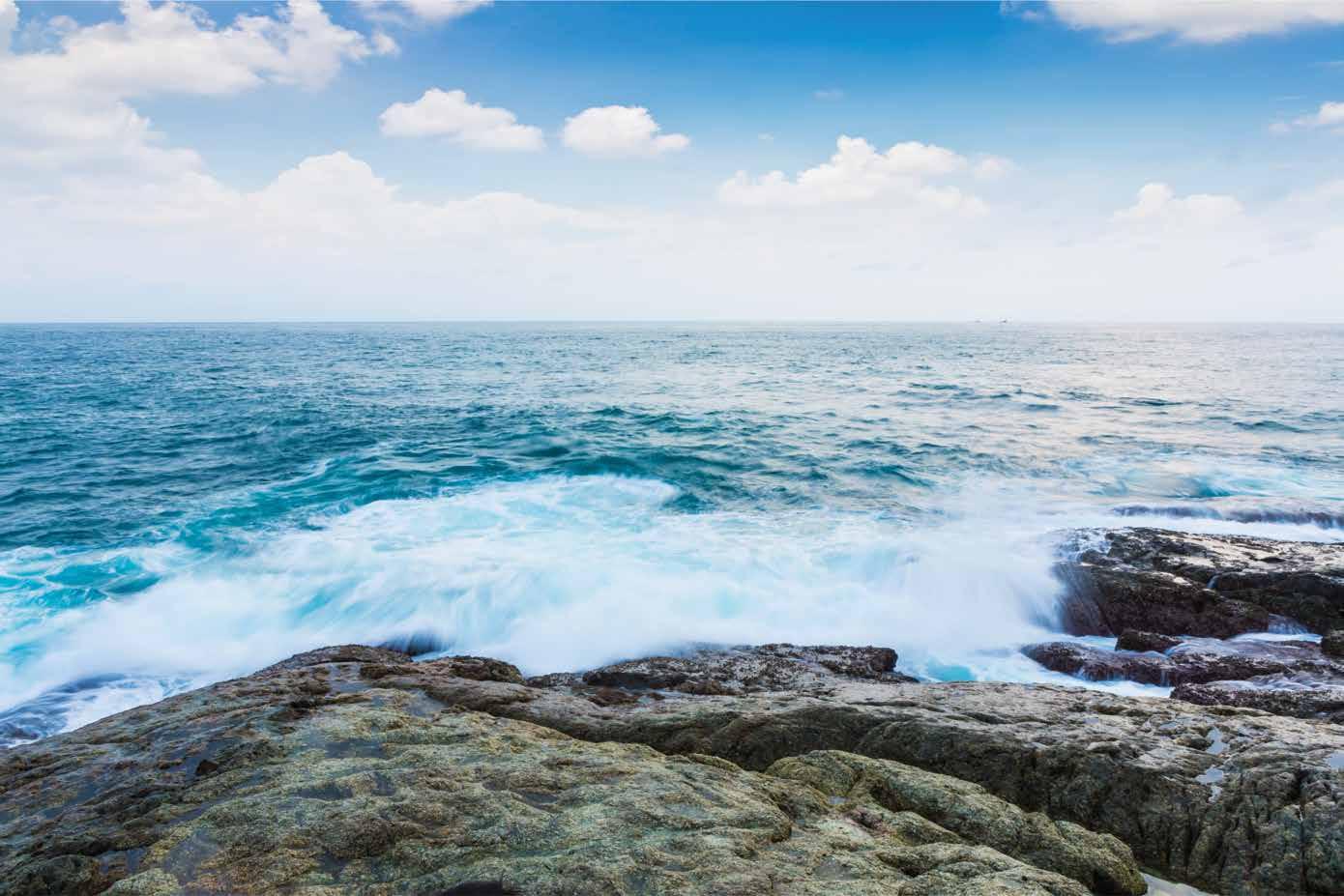


Fire up the engines, shine up the gel coat, ice the cooler and retie those lures. Summer is here in the Florida Keys.


Of course, in a tropical paradise where we can snorkel even on Christmas Eve, we sometimes forget what a true summer is all about. But when our outdoor thermometers start working overtime and the water is a slick calm more often than not, we’re reminded that when school’s out, our islands are the best place to dive in.
We here at the Keys Weekly Newspapers are thrilled to present our 2023 OnBoard magazine. As we reimagined this year’s iteration, our guiding goal was to create an allencompassing offering that covers not just fishing and lobstering, but the essence of the summer boating lifestyle from Key Largo to Key West.
Of course, there’s still plenty for anglers and bug hunters to enjoy – check out Captain Bill Giliberti’s mahi rundown, Jim McCarthy’s look into the ever-growing popularity of small-craft fishing, and updated lobster regulations and courtesy guidelines.
But for those who don’t focus on filling a cooler with the day’s catch, get geared up with all the gadgets you wish you had at the sandbar – and the non-negotiable essentials you can’t afford to forget. Pack yourself one of Annie Briening’s Snackle Boxes – yes, it’s exactly what it sounds like – and take Erin Stover Sickmen’s advice on how to make your four-legged family member part of the fun.
When you do head out, be sure to bring Stephanie Mitchell’s summer party playlist with you. After all, what’s a day on the boat without blasting your favorite tunes? But please, be a conscientious captain – as described by Mark Hedden and Bette Zirkelbach, our islands are home to majestic birds and aquatic animals in need of our protection.
Of course, you didn’t open this magazine to stop on the first page. Please enjoy our 2023 OnBoard Magazine, and use it to have a summer you’ll never forget here in the Florida Keys.
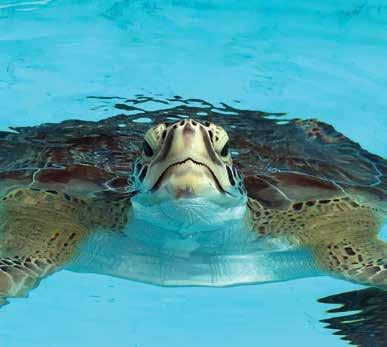
Sincerely,
Alex Rickert Editor



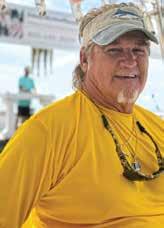
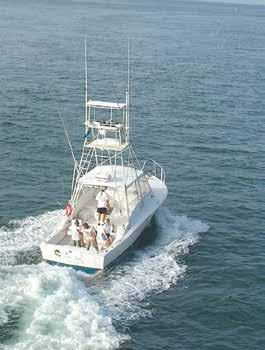
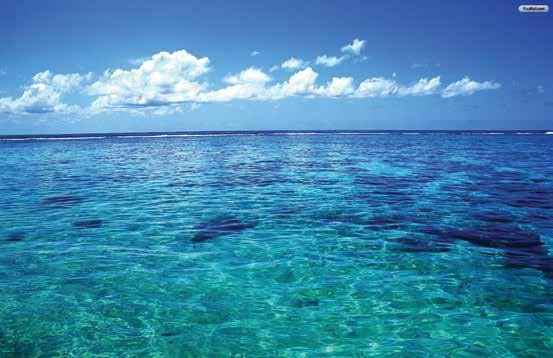


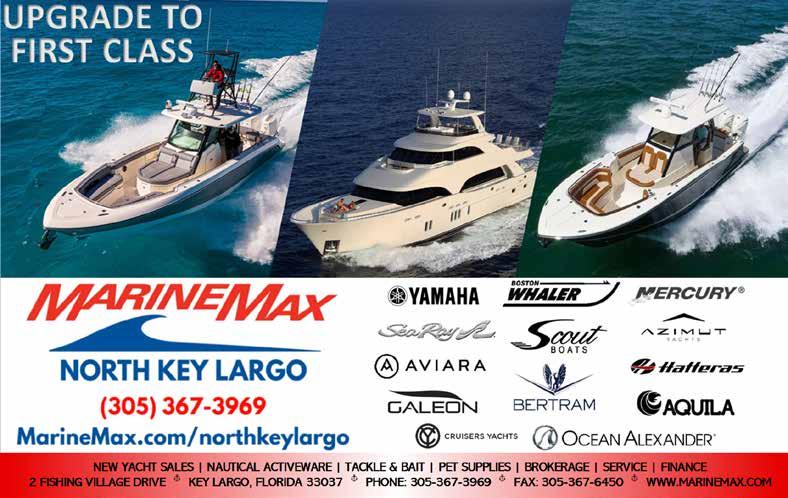
Publisher Jason Koler
Managing Partner Britt Myers
Creative Director Stephanie Mitchell stephanie@keysweekly.com
Editor Alex Rickert alex@keysweekly.com
Art/Design
Irene de Bruijn irene@keysweekly.com
Staff Writers
Mandy Miles mandy@keysweekly.com
Jim McCarthy jim@keysweekly.com
Copy Editor Mike Howie mike@keysweekly.com

Director of Sales
Manuela Carrillo Mobley manuela@keysweekly.com Account Executives
Stephanie Mitchell stephanie@keysweekly.com
Patti Childress patti@keysweekly.com
Jill Miranda Baker jill@keysweekly.com
Production Manager
Anneke Patterson anneke@keysweekly.com
Art/Design
Javier Reyes javier@keysweekly.com

Web Master Travis Cready travis@keysweekly.com

Executive Administrator
Char Hruska char@keysweekly.com
Contributors
Annie Briening, Capt. Bill Giliberti, Mark Hedden, Erin Stover Sickmen, Bette Zirkelbach Digital Support Overseas Media Group
Toddler and Kid sizes now available!
If it breaks, just BAND-IT!
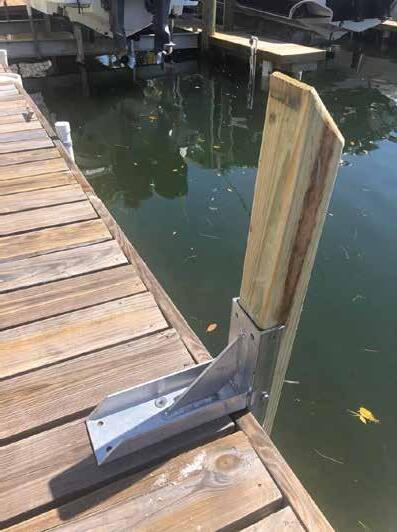
• allotment of rubber in various diameters

• cutting and securing tools


• rope and stainless wishbones
• & more inside a custom waterproof
BY STEPHANIE MITCHELLAs we dive into summer — quite literally — boats offer one of the best ways to stay cool and relax in the Florida Keys, where stunningly blue water provides an ideal backdrop for all outdoor activities.

Who doesn’t love hopping on the boat for a quick jaunt out to catch a summer sunset or diving in for spiny lobster(s) while your friends cheer you on, knowing their butter-drenched dinner depends on your success.

This is our magical time of year. Our islands slow down and the streets aren’t as packed with tourists. We hit the mental reset button and we remember these long, lingering afternoons on the boat for the rest of the year — as we serve up smiles to those who save all year to pretend they’re us for a week.
To get the summer party started, we’ve compiled a playlist that’s the perfect soundtrack for the boat, a backyard barbecue, a neighborhood block party or a poolside happy hour.
Now for the music…







KAYAK FISHING IS TRENDING UPWARDS

An island chain known for its rum runners, Key lime pie, blue seascape and laid-back lifestyle boasts some spectacular fishing.
Charters captained by those who truly know the sweet spots get visiting anglers out to the offshore’s deep blue for some sailfishing. In the backcountry, anglers immerse in the beauty of the Everglades — a neighbor to the Florida Keys — as they explore the mangroves and lure the easilyspooked bonefish and tarpon.
A COVID pandemic that kept people separated for a period of time resulted in a water recreation explosion across Florida and the Keys — boats packed sandbars and popular dive destinations. Another trend is making waves in recent times: fishing via kayaks and paddleboards. A relatively inexpensive option for the water enthusiast, it provides an intimate and captivating experience of the Keys’ surroundings from mangrove tunnels to tiny islands.
Of all small craft, kayaks and paddleboards are the ultimate entry-level vessel for the one on a fixed budget who’s seeking a little rod or fly fishing. A boom in kayak fishing was seen in 2014, as referenced by a Recreational Fishing and Boating Foundation, which estimated 38 million kayak fish outings in North America. Low upfront investment, little operating costs, and versatility were among the key selling points that led to the rapid growth of the kayak for recreational uses like fishing.
Morgan Promnitz, director of fishing business development for Hobie, told Kayak Angler Magazine that kayak fishing will continue to blossom with no signs of slowing down. Just look at all the kayaks attached to a vehicle rack as they traverse U.S. 1. Portability and accessibility were some barriers, but Promnitz said inflatable kayaks are an option for people who don’t have an option for a high-end model.
With a boost from social media over the years, especially from those angler Joes producing videos on YouTube, awareness sprang up over a relatively inexpensive and uber exciting hobby.
Fishing from a kayak or paddleboard certainly has its benefits in the Keys. These small fishing craft are not only great in terms of stealth to approach a bonefish or tarpon, but the self-propelled vessels are also the perfect exercise. Relatively inexpensive models on the market, as low as $400, allow a person the chance to fish in shallow waters, near the mangroves or the nearshore on a calm, picturesque day. And despite less room for storage compared to a flats boat, crate systems are available on the market — as low as $41.99 — to hold your tackle, gear and rods while heading out on the kayak.
Don’t want to buy a kayak or paddleboard? No problem. There are ample spots in the Keys to rent a recreational kayak, Hobie pedal kayak or paddleboard. For instance, Florida Bay Outfitters in Key Largo and Marathon offers kayak and canoe rentals for a few hours or several days. The store’s variety of kayaks and paddleboards allows the beginner to the seasoned outdoors person the ability to explore and fish.
Just make sure you have a saltwater fishing license, some sun protection, water and snacks along with your fishing gear before you head out.


Lab!
Since 1993, Mote Marine Laboratory has been a leader in protecting Florida's Coral Reef through science-based restoration techniques.
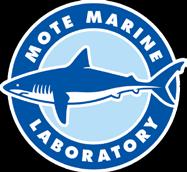

Learn more by attending one of our weekly tours at one of our three Key's locations. Scan the QR code to reserve a spot at your preferred location.
Show your support of Mote's coral reef research and restoration efforts by purchasing a Protect Our Reefs license plate from your local tax collector.
Help fund Mote's coral reef research and restoration programs by visiting mote.org/coraldonation.

COME FOR THE FOOD. STAY FOR THE VIEW.

GLUTEN-FREE PIZZA AND VEGETARIAN MENU

WE LOVE KIDS & DOGS
AMAZING, DIRECT OCEAN VIEWS

Protected breakwater wall, 6' depth, 70' dockage, oversized 2 car garage, storage plus carport. Recently remodeled 3 bed/2 bath upstairs, separate conforming 1 bed/1 bath downstairs, new impact windows/sliders, granite, stainless appliances, wrap around lanai. Fish, kayak, paddle board, a great investment/vacation rental or family home awaiting many family memories. $3,400,000
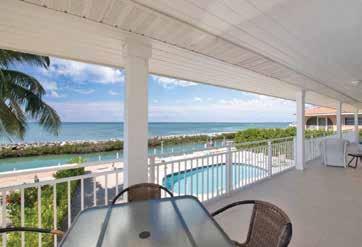
Broker Associate Keysislandsales.com


Brenda@keysislandsales.com



Servicing “The Florida Keys” since 2004

“THE LOBSTER CASA”BY ALEX RICKERT
MASSIVE OFFSHORE WEEDLINES ARE THE STUFF OF KEYS ANGLERS’ DREAMS. BUT THE LATEST MASS AFFECTING THE ISLAND CHAIN IS ONE THAT SOME WISH WENT ELSEWHERE.
By now, most have heard about the massive “blob” of sargassum — composed of multiple brown algae species – approaching the Keys. Stretching nearly across the Atlantic Ocean, with an estimated mass of 13 million tons as of April, dense, odorous patches piling up on beaches throughout the island chain will continue causing problems in the coming months.
Earlier this year, Keys Weekly sat down with renowned Florida Atlantic University researcher Brian Lapointe and Florida Keys National Marine Sanctuary research coordinator Andy Bruckner to better understand what’s driving the algae, and what the Keys can expect from here.
First things first: This isn’t a one-time traveling mass that appeared out of nowhere. The Great Atlantic Sargassum Belt is the world’s largest recurring macroalgae bloom, often extending from the west coast of Africa to the Gulf of Mexico across the southern edge of the Sargasso Sea. The massive floating habitat is a hotspot for biodiversity, providing food and protection for fish, mammals, marine birds, turtles, crabs and more as well as a nursery for mahi mahi and jack species.
The belt’s annual bloom usually begins in the winter and spring months, typically peaking in early to mid summer. Its distribution throughout the Atlantic Ocean and Caribbean Sea is largely driven by currents and ocean circulation, and as Bruckner explained, much of the algae encountered in the Keys is carried by the Gulf Stream up from the Caribbean.
While the floating version of sargassum provides critical offshore habitat, algae piles on beaches and in nearshore waters are problematic.
Heavy seaweed buildup covering alreadylimited sandy patches on Keys beaches can act as a physical barrier for females trying to nest, and can prevent hatchlings from emerging from nests and reaching the water. Sea turtle moms are known to avoid beaches smothered with sargassum, increasing competition for space at alternative nesting sites. In fact, studies from Florida Atlantic University conservatively estimated net hatchling production losses from sargassum to reach 22% on beaches in Boca Raton.
“Dead zones” can also replace vital nurseries as large quantities of sargassum create anoxic conditions that threaten marine life. In shallow water, degrading algae masses can kill plants and animals on the seafloor, while hydrogen sulfide gas released by the decomposing organism is a toxic eye and respiratory irritant – and potentially deadly for some marine life. As if that wasn’t enough, it smells like rotten eggs, pairing an unwelcome scent with an ugly sight for Florida’s tourist throngs.
Lapointe has studied sargassum since the 1980s, but he said that as he analyzed tissue from algae in the belt in more recent years, one nutrient in particular stood out.
“I was analyzing data from the 1980s that I collected. … In comparing those numbers
with post-2010 data, that’s where we see nitrogen levels going up 35%, and the nitrogen:phospate ratio went up by 111%. That was my eureka moment,” he told the Weekly. “This sargassum looks like it’s being fed by the major rivers like the Amazon, the Orinoco, the Congo and the Mississippi.
“It just so happens that the nitrogen and phosphorus contents are highest in the winter and spring, just when the rivers are discharging the most. … By summertime, those river discharges are actually going down, and that’s when the growth slows down as tissues become depleted of nitrogen and phosphorus.”
Over the past 12 years, a formerly limiting nutrient to the growth and biomass of the belt ceased to be a handcuff, as human population growth fueled high reactive nitrogen levels with wastewater, fertilizers, deforestation and other contributors, Lapointe said. The belt is capable of doubling its size in anywhere from two to four weeks under ideal conditions, and with the algae continuing to exhaust the amount of available phosphorus, another critical nutrient, it turns to a chemical analog: arsenate, a salt of arsenic acid.
Researchers began actively tracking the size of the belt with multiple methods, including satellite imagery, during the first bloom in 2011. Since then, the 2018 bloom has been the record-setting standard, with 2022 as another severe event.
Thus far in 2023, the blob had an early start to its annual growth, and appears set to eclipse all previous years – but with the bloom set to peak around June or July, the final impact is yet to be seen. A sargassum

outlook summary published by the University of South Florida’s Optical Oceanography Lab indicated record sargassum abundance in the Caribbean Sea in April, with comparable quantities in the Gulf of Mexico to prior major bloom years.
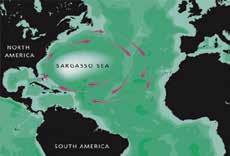
The most recent bulletin states “the total sargassum quantity is expected to increase over the next few months, with impacts of beaching events in the Caribbean Sea and Gulf of Mexico worsening accordingly … though it is difficult to predict exact timing and location for individual beaching events.”


With sargassum research a growing priority over the last decade, further work using satellites to track fine-scale current data should prove crucial in accurately predicting movements of algae within the belt.
Unfortunately, disposing of the piles of smelly sargassum when it washes ashore isn’t as simple as scooping it all up and using it for fertilizer. With such a high arsenic content, the macroalgae can’t safely supplement any plant intended for human consumption.
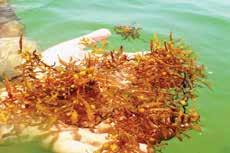

And while various shore-based mitigation procedures are in place, none exists on a large scale. Because NOAA considers sargassum “essential fish habitat” and “critical habitat” for sea turtles, harvesting at sea is prohibited.

“These federal rules need to be reconsidered, as the massive sargassum influx in these areas is doing more harm than good,” Lapointe said. He advocated for the development of a coastal protection plan in the Keys and South Florida to mitigate local effects.
“This could involve using booms to protect canals and boat basins and harvesting sargassum along shorelines where it is decomposing and causing environmental, economic and human health risks,” he said. “This would help protect beaches for residents and tourists alike.”






POOLSIDE
OCEANSIDE



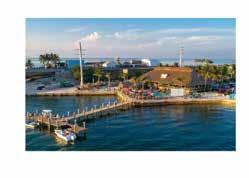
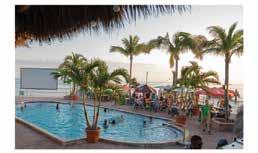


There’s no debate: with stifling heat returning for summer in the Keys, the next few months are made for cooling off at the sandbar. These days, the islands’ most popular gathering places host everyone from casual visitors to boaters who practically set up camp after dropping the anchor. With weeks of sandbar weather ahead, our OnBoard staff did some rigorous “research” to find the products that made us say, “Man…I wish I had one of those.”

An innovative table designed for the cocktails-and-sunsets-type boater, Docktail Bar offers dozens of different layouts and colored SeaDek combinations for any type of boat. Most models have attachments to conveniently drop into a rod holder or attach to a flat surface, but the tables are also perfect to create an entertainment station in the middle of the sandbar with a simple PVC post. A true game-changer when libations are a must.
$179-$599 | DocktailBar.com

It’s normally played on a beach, but works just as well in the shallow waters of the sandbar. Bottle Bash challenges players to use precision frisbee throws to knock their opponents’ bottle off its pedestal, and it’s a perfect fit for the casual player all the way up to your weirdly competitive friend. For an extra challenge, try playing with your drink in one hand.

$49.99 | Amazon
Boat days and subs are a match made in heaven, but nothing will ruin a perfect lunch like a soggy sandwich that’s been sitting in a cooler. Designed to protect a 6 or 12-inch sub, the SubSafe can also be a perfect storage spot for snacks or valuables, and even makes a great cocktail shaker.
$19.99 | Publix & SubSafe.com
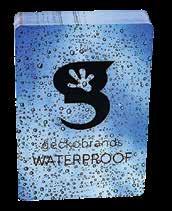

Take your games on the boat without worrying about a splash. With a textured surface to prevent wet cards from sticking together, Gecko Brands’ deck is made from waterproof material that’s flexible and washable. Includes a plastic carrying case.
$5.95 | The Tackle Box


Days at the sandbar can be spent awkwardly holding your beverage of choice above the water, hoping it doesn’t get a saltwater infusion. These floating drink holders are designed to fit popular sizes of tumblers from major manufacturers, and they include a leash – so you can have your hands free while the next sip is always within arm’s reach.

$19.99 | TumblerTubes.com
Summers in the Keys are full of sandbar days with barbecues at night – unless, of course, you just bring the whole grill on the water. With attachment points for a wide variety of mounts, enjoy your flamecooked favorites before you even get back to the dock.
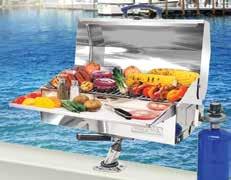

$229.99 | West Marine







Last minute boat days are the best, and in our household we have one rule. Scratch that, two rules... 1. never say no to a boat invite, and 2. bring fried chicken and beer or a seltzer of your choosing.

But in case you are racing out the door to the dock, we’ve compiled a handy check list of things not to forget for your boat day adventure.
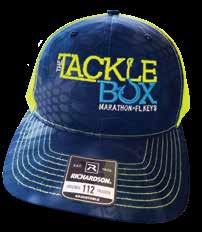
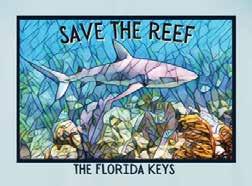


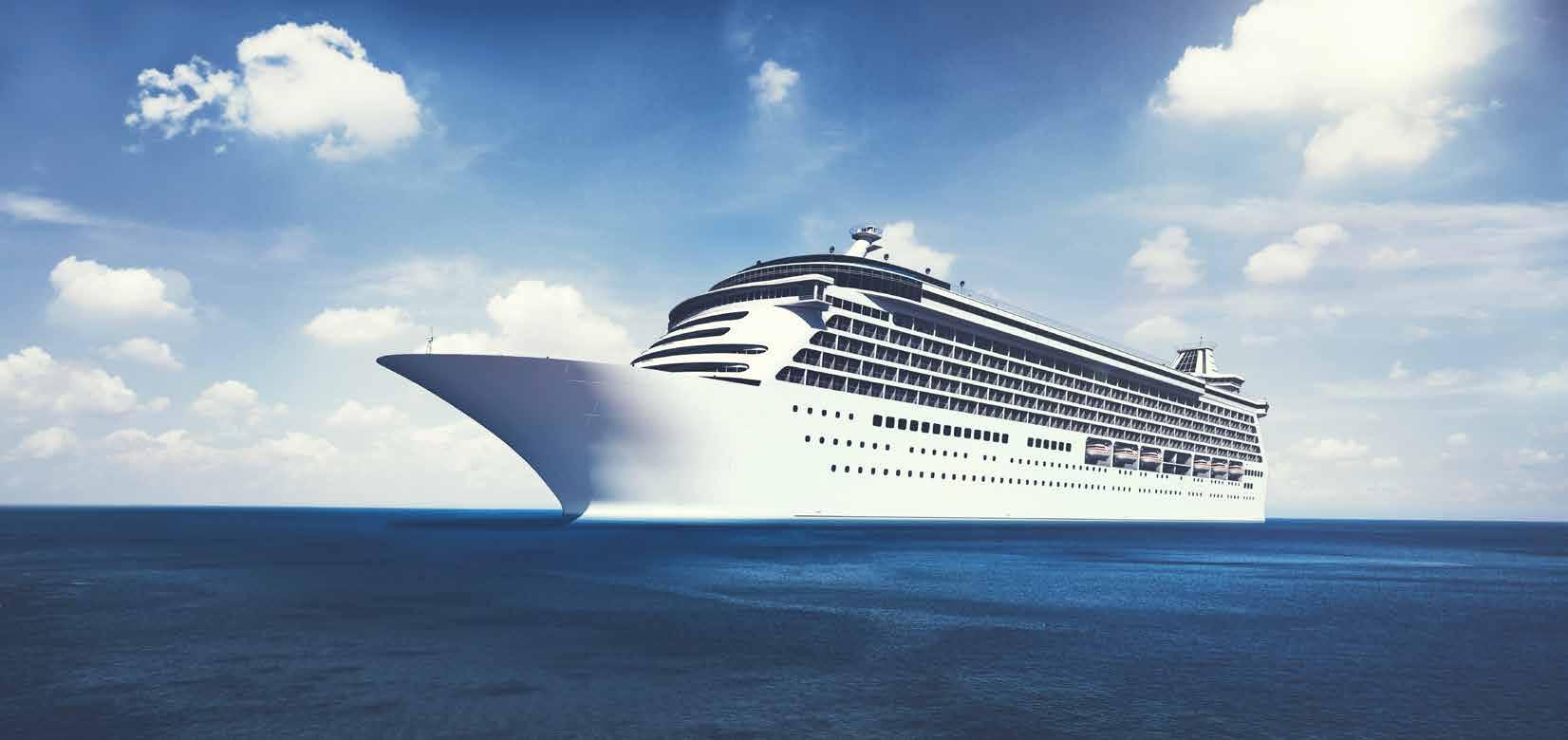


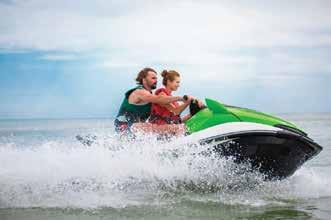


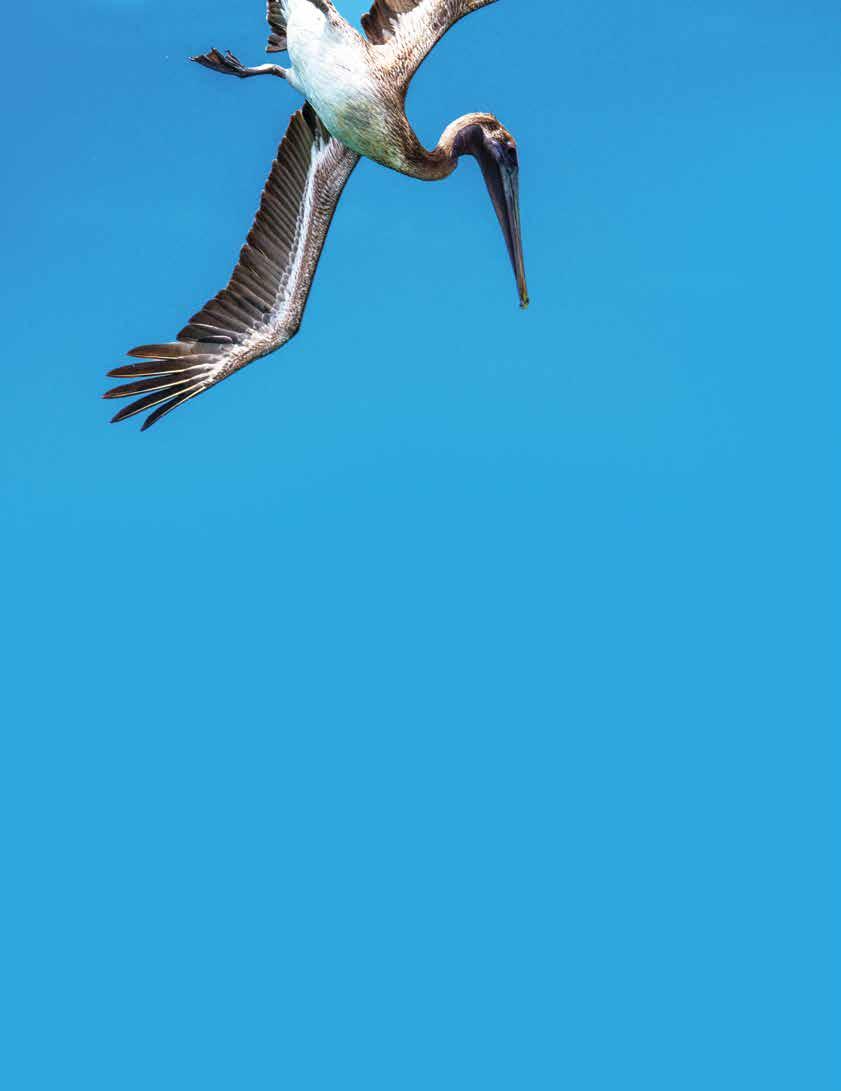
It seems to me that pelicans, like Rodney Dangerfield, get no respect. Or at least not as much respect as they deserve.
When you think of graceful oceanic birds you think of, say, northern Gannets, which dive and hit the water like sleek little missiles, diving as deep as 40 feet to catch their prey. Or, perhaps, of osprey, which hover, then make powered dives to catch and muscle fish into the air in their razorsharp talons. Or great blue herons, which stand statue-like in the shallows on their long legs, lacy nuptial feathers blowing in the breeze, waiting to stab down quickly at the first oblivious fish, frog or crab to stray beneath them.
You generally don’t think of pelicans, which, if you are not paying attention, seem to hit the water like a turkey dropped from a helicopter, and then just sit there floating for a while.
I think part of it is their shape. They are big, rotund, goofy-looking birds that weigh up to 10 pounds and don’t correspond with many people’s notions of physical grace, not unlike Rodney Dangerfield. When they walk, they do so with kind of a shuffling waddle – also not unlike Rodney Dangerfield – which several serious scientific texts I have read describe as “clumsy.” And they’ve got that long, unwieldy bill that runs almost half the length of their body.
They look a little bit like dinosaurs, which makes sense, as they haven’t changed their shape much in about 30 million years.
When I say pelicans in this instance, I mean brown pelicans, a species that is hard to avoid in the Florida Keys year-round. (We
also get the larger, less common, more swan-like white pelicans here in the winter, but anyone who is not wowed by the sight of a white pelican is just living their life wrong.)
The notion that brown pelicans are ungainly creatures is belied, though, by their actual physical capabilities. They are some of the most agile, dexterous and naturally nimble creatures out there. They just hide it well.
One of the easiest ways to get clued into their physical fluidity is to find yourself at the beach, or out on the water, on one of those windless summer mornings, when the water is as smooth and gleaming as a mirror. Odds are a pelican will come along soon, and just inches above the water, flying so slowly that it seems impossible for the bird to stay aloft. The bird will look like it is hardly moving a muscle. Occasionally a wingtip will brush the water’s surface. (If you’re in a boat, they may rise up to clear your wake, then drop down again.)
What’s happening is the pelican is taking advantage of ground effect, a phenomenon where the air pushed down by the wings hits the water and pushes back up, creating a cushion of air that keeps the bird aloft with a seemingly impossible lack of speed. (It’s the same phenomenon that allowed Howard Hughes in the 1950s to fly his borderline non-functional seaplane the Spruce Goose for 26 seconds and thus fulfill a government contract.)
The place where the brown pelican’s aerial adroitness really becomes apparent, though, is when they feed, which can be seen in the nearshore waters off the Keys almost any time of day, but especially in the early morning and early evening.
The brown pelican is unusual among the eight pelican species in the world in that they feed by plunge diving. (The closely related Peruvian pelican is the only other pelican species that does that.)
They will dive from up to 60 feet above the water, and they will dive into water as little as two feet deep. At first it looks a little ungainly, a little unprofessional. But watch them long enough and it becomes clear what precision is involved.
They don’t just fall into the water. They dive in a ritualistic manner, at first rising up a little, then tucking in their neck and angling to the right, then folding their wings, sticking their neck out, and corkscrewing to a point where they nearly invert themselves, hitting the water at angle of somewhere between 60 and 90 degrees, depending on the light and clarity of the water. The left side of their neck takes the brunt of the impact, which works, because their esophagus and trachea are located on the right side.
Their body only partially sinks, kept afloat by sacs beneath the skin, which also help absorb the crash. But their head goes under, with their bill open, the impact causing their lower mandible to bow on both sides, like the bird suddenly has a cartoonishly wide underbite. It allows the pouch below, known as the gular sac, to stretch and fill with up to 21 pints of water, which is three times what their stomach can hold. And in all that water is what they want – a number of small fish.
Draining the water out can take up to a minute, and oftentimes a Laughing Gull will come in and land on a pelican’s head, prying their small chisel of a bill into the pelican’s much larger bill, to steal fish. You’d think it would irk the pelicans, but they seem pretty placid about it, like losing a percentage of their catch is just the cost of doing business.
Adult pelicans are thought to be successful in close to 85% of their dives; juveniles, less so.
It’s hard to find any data about how many dives the average pelican makes a day, but I’ve sat there and watched them dive repeatedly for hours on end, with no sign of their energy flagging or their form degrading. After a while it gets hard to see a brown pelican as anything less than a fullon exemplar of grace.








If you’re lucky enough to go boating in the beautiful Florida Keys, there’s a great chance the obligatory “pub sub” or bag of your favorite fried chicken is on the lunch menu. Take it up a notch and elevate your lunch to the next level with the “Snackle Box.’’ (Get it? Snacks + Tackle Box = Snackle Box.)
A portable charcuterie-by-the-sea, if you will, is the perfect way to tote your favorite munchies for a day at the sandbar, fishing charter lunch break or lounging at the beach. (Bonus: The box closes to keep away any creatures that may try to steal your snacks.)

Snackle Boxes carry an assortment of snacks in compartments in the same way a tackle box holds a fisherman’s tools, lures and line. Even better, the compartments can hold each bite separately so they won’t get soggy depending on what you choose.
Slice up meat and cheeses, fresh fruit, add some favorite dips and hummus – and don’t forget the chips and crackers.
We wanted to create the perfect portable charcuterie and went for a fresh local ceviche (see our recipe), shrimp cocktail with homemade horseradish, mozzarella wrapped in salami, Mediterranean hummus with celery sticks, grapes and loads of tortilla chips and plantain strips. We used compostable cups to create individual servings for our friends as well!
You can customize your Snackle Box to pretty much anything that you and your crew are craving.
Ceviche is made with fresh fish (or shrimp, conch or scallops) cured with lime juice, then tossed with onions, cilantro and bell peppers. The perfect light, refreshing summer snack.

- Your favorite fresh fish - we used local yellowtail snapper – diced into ½-inch cubes


- 3/4 cup fresh lime juice (4-6 limes) freshly squeezed
- 1–2 garlic cloves, minced
- 1 fresh serrano or jalapeño chili pepper, seeded and very finely chopped
- Fresh cilantro, chopped
- 1 cup diced bell peppers – choose more than one color
- 1/2 a red onion, thinly sliced
- 1 tbsp olive oil
- 1 to 1-1/2 tsp kosher salt (start with 1, add more to taste)
- 1/4 tsp black pepper
Combine all ingredients into a bowl and season with salt & pepper to taste. Place in refrigerator and let rest for about an hour before serving.
COME BY BOAT, BIKE, FOOT OR CAR!
LUNCH, HAPPY HOUR & DINNER
LIVE
HOUR
4-6 PM
BRUNCH: including chorizo Breakfast Burrito, Guava French Toast, Crab Benedict and BOGO Mimosas & Glasses of Sparkling Wine
Regular menu available
MONDAY: Closed
TUESDAY: Jumbo Gumbo Bowls
Tacos and Tequila
Live Music: Roger Jokela
WEDNESDAY: Wine Time Wednesday ($15-$20 bottles)
Live Music
THURSDAY: Prime Rib Night
Live Music: John Bartus
FRIDAY: Abstract Radio

SATURDAY: Brunch
BOGO Mimosas & Sparkling Wine
SUNDAY: Brunch
BOGO Mimosas & Sparkling Wine
Monday: Closed | Tuesday - Sunday: 11:00am - 10:00pm












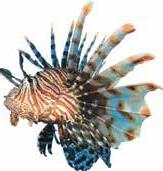
The Florida Keys, with their abundance of sea life and picture-perfect blue-green waters, have an enchanting allure for boating and fishing enthusiasts. Sea turtles have been drawn to this same ecosystem long before recreational sportsmen, but human impacts are causing undeniable problems for these beloved reptiles. Educating yourself on the dangers these impacts pose to sea turtles and making a conscious effort to fish and boat responsibly while enjoying the Keys’ surrounding waters will help to save lives.
The Turtle Hospital, located in Marathon at MM 48.5, has been rescuing, rehabilitating and releasing sea turtles back into the wild for more than 36 years. The hospital is seeing an increased number of sea turtles with boat strikes. With more than 20 documented injuries in the Florida Keys since the beginning of the year, the recent influx happens as turtles make their way through shallow waters to nest. Many of these vessel strikes result in death for the sea turtle.
In addition, the hospital frequently admits sea turtles entangled in fishing gear. Turtles are opportunistic feeders, meaning they will eat just about anything. Unfortunately, a turtle’s digestive tract is unable to break down synthetic material once it

is ingested, and very often it will cause an intestinal blockage called an impaction. A turtle has little chance of eliminating the impaction on its own in the wild, and this condition will usually end in starvation. At the Turtle Hospital, impacted turtles are treated with mineral oil, fluids, vitamins and broad-spectrum antibiotics.
Sea turtles are also caught in fishing and buoy lines far too often. Fishing line takes 600 years to biodegrade. So, every single piece of monofilament that has ever entered the ocean is still there, and there is more and more every day. Monofilament fishing line is very difficult to break, so if you fish, or if you see someone else’s discarded line, please dispose of it properly.
Monofilament recycling bins are now located on fishing bridges, beaches and marinas throughout the Florida Keys. If you pick up a piece of fishing line, you will save a life – in its 600-year life span, the odds are good it will get caught on a turtle, shark, dolphin, fish or coral.
All five species of sea turtles found in and around the Florida Keys are classified as endangered or threatened and are afforded corresponding protection under U.S. federal and Florida state laws.
Please help to spread the word about sea turtles and the challenges they face. A little bit of knowledge and a lot of passion will go a long way. Have fun out on the water, and when boating, stay alert and avoid sea turtles.
To report an injured turtle, call the Turtle Hospital’s stranding hotline at 305-481-7669.
Visit the hospital, open every day from 9 a.m. to 6 p.m., to meet sea turtles up close. For more information or to book an educational program, visit turtlehospital.org or call 305-743-2552.




I’m going to tell you the best-kept secret of the Keys. The dogs already know, so it seems only fair to tell the humans. What the snowbirds don’t realize, as they flock north in search of temperate climates, is that the locals are preparing for their own magic season. Summer in the Keys is brutal, yes. But with those punishing temperatures come placid water days, perfect for offshore explorations. And as the humans prep boats and pull gear out of the garage for summer adventures, their four-legged friends are looking out the window in anticipation. Dogs know. And those of us with willing canine companions know there’s nothing better than outdoor exploits with our best friends. However, there are a few things to remember as we charge into the season of beach days and boat outings.
The only thing that improves a day on the sandbar is the addition of a pack of playful dogs. Well, and cold beer. And maybe fried chicken. But really, dogs make the day. Of course, your friend is probably even more excited than you are to hit the not-so-high seas. Not to curb that enthusiasm, but there are some helpful basics that will ensure both dogs and humans have the best day possible.
Safety is paramount when it comes to taking pets on a boat. All dogs, regardless of swimming prowess, should have properly fitted life vests with a handle on their back. A strong current or mouthful of seawater can cause the toughest dog to get in trouble. Vests should be brightly colored and allow for comfortable movement and potty access. Now, let’s consider the reason for the vest – dog overboard! It can happen in a flash as an overzealous yelper barks at the wake or catches sight of a cormorant. Even a tight, fast turn can send a pup flying. The first safety step is to cut the engine. If your dog is further back, turn on the engine so you can get close enough before cutting it again. If possible, call your dog to the vessel and grab the handle on their vest. For bigger breeds, be cautious about jumping in after them, as a panicking animal reacts much like a panicking human and can pull a rescuer under with them. If possible, drop a floating platform or paddleboard in the water until you can grab their vest and get them on board.

Safety is important, but so is comfort. Our waterborne pups should have the same accoutrements as their human counterparts. Dogspecific sunscreen is a good idea, especially for light-colored animals, or those with thin spots of fur. Fresh water is an obvious necessity, but a collapsible dish makes it easier to manage. A soft, dry towel will also be appreciated. Think how great that snuggly hoodie feels on the chilly ride home. Your friend agrees.
If non-motorized vessels are your preferred mode of aquatic transport, you can still easily bring along your dog. Paddleboards, especially, provide an easy platform for animals to occupy. The most important first step is just to familiarize your dog with the concept, and motion, of the board and to adjust your paddling to compensate for the extra weight and movement. As with boats, make sure your dog is wearing a vest. Pull away from the shore to prevent the jump-and-run instinct. Once you’re out on the water, start yourself in a sitting position so you can respond to your dog’s movement around the board. Get them accustomed to sitting on the front of the board, where they can lie flat and calm themselves. Always be prepared for a wild leap! Just like on a boat, dogs can spot exciting creatures (real or imagined) out in the water and launch themselves.
For comfort, boat rules apply. Make sure both human and canine have plenty of fresh water, a few snacks, maybe a small towel for traction. The main difference between a paddle and a boat day is the lack of shade. While the water may feel cool, remember that your passenger is likely in direct sunlight for the duration. Time your outings accordingly and adjust as needed. Another difference is that you’ll likely be away from land for longer stretches of time. If you plan to be out for a while, bring a short leash and plan a potty stop on an island, or at a public dock.

Not all summer fun in the Keys happens out on the water. Some is just water-adjacent. With the daily pace of life slowing a bit, more owners find time to take their pups for a sunset run on the boulevard, or a morning trek to Truman Waterfront Park. While ticks are not as big a problem here as they are in the wooded, weeded north, it’s still good to be cautious. Dog parks can serve as a temporary jumping off point (pun intended) for fleas so it’s a good idea to keep your dog up to date with a broad spectrum flea/tick preventative. The same applies for keeping your dog up to date on their vaccines. Treat the dog park as a kindergarten class. You never know what germs someone else is packing.


Beyond basic healthcare and upkeep, hotter temperatures call for closer attention to your dog. Make sure you carry water for your companion, especially during the hotter months. Keep outdoor time during peak heat and UV hours limited. If you’re out for a longer stretch, make sure your pet can duck into a shady spot for relief. And the paws, don’t forget the poor paws. Each year, numerous groups publish PSAs on the risk of burns to a dog’s pads during warmer months. In the Keys, where the UV index hovers daily at the maximum level, it’s especially important to be aware of hard surfaces such as sidewalks. The American Kennel Club advises that if temperatures hit 85F, without a chance to cool, surfaces can cause burns. If your dog will tolerate booties, there is a wealth of adorable options. If not, paw protectants like Musher’s Secret (or Vaseline in a pinch) add some protection. Perhaps the best tactic though is to stick to the grass or time your wanders for early morning.
Land or sea, the goal is to keep your pet comfortable so you can both enjoy the day. The best advice for taking your dogs out on the water boils down to common sense. Basically, if you might need it, they might need it. Snacks? Likely. Water? Definitely. Life vest, sunscreen? Yes, yes. Dry soft towel? Of course. Even with the bit of extra effort, nothing compares to the bliss of having a dog accompany you for your summer outings. Ten out of ten. Highly recommend.


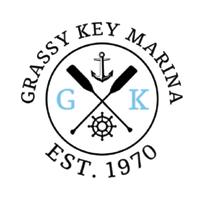


MAHI-MAHI, ALSO KNOWN AS DOLPHIN OR DORADO, ARE ONE OF THE MOST SOUGHT-AFTER SPORTFISH HERE IN THE FLORIDA KEYS. NOT ONLY DO THEY PUT ON A SHOW, BUT THEY ARE ALSO EXCELLENT TABLE FARE. YOUR BEST CHANCE AT TARGETING THESE FISH IS TYPICALLY OFFSHORE BETWEEN MAY & OCTOBER.

The fish are pelagic, meaning they travel in open water, don’t congregate around our coral reefs, and don’t establish or defend a particular territory. For the most part, these fish travel in schools of a few dozen up to several hundred fish. As one of the fastest-growing fish in the ocean – they reach sexual maturity at just four months – these predators can travel up to 60 miles in one day, which means they build up quite an appetite and are always on the hunt for their next meal. They forage on a variety of other fishes including squid, flying fish, ballyhoo, small jacks and even smaller mahi.
We categorize mahi based on their fork length, measured from the tip of their nose to the inner fork of the tail. These classifications range from peanuts (20 inches or less) to schoolies (20 to 30 inches), heavy lifters (30 to 38 inches), gaffers (38-plus inches) and slammers (over 40 pounds).
We target mahi-mahi in anywhere from a few hundred feet up to several thousand feet of water, typically 13 miles or more offshore. While offshore, we look for weed lines made from sargassum algae that have air sacs and float in large mats on the surface. In a best-case scenario, the sargassum weed lines are uniform and densely packed so you don’t have to constantly free a trolling bait from small bits of weeds. However, this is not always the case, and trolling through scattered areas of grass is sometimes necessary when left with no other option.
We also look for any type of floating debris or structure that might provide shelter for mahi’s prey items. Items like wooden pallets or discarded cargo nets create their own ecosystems by providing shelter for shrimp, crabs and jacks in the open water – all of which mahi love to target for their feasts.
Another telltale sign when targeting mahi are “working” birds. Our favorite birds to find offshore are frigatebirds. Mahi will chase their prey up to the surface, giving the frigatebirds a shot at an easy meal. Circling and diving birds will give fishermen a visual clue as to where a school of mahi may be feeding.
When trolling for mahi, a good spread consists of a rigged ballyhoo in each outrigger and two trolling baits such as a Billy-bait or three-inch artificial lure on two flatlines. I like to keep my baits out of the prop wash (air bubbles created by cavitation of the prop or the exhaust of the engine). Depending on the type of boat you are fishing from, the distance of your trolling baits will differ. Ideally, you’ll want to have your rigged ballyhoo a minimum of 30 feet behind your flatlines to avoid tangles in your spread when making a turn.
Depending on personal preference, some anglers will use various colored skirts on their ballyhoo, but I prefer a naked ballyhoo because it appears more natural to the mahi. I rig my ballyhoo on a 6/0 long shank Mustad hook with 80-pound leader and a copper wire to secure the ballyhoo to the rig. Many people use oversized tackle for mahi, but they are much more enjoyable to catch on light tackle. My primary setup is a 6500 series spinning reel on a 7-foot mediumlight action rod spooled with 20-pound monofilament. To attach the main line to your leader, I suggest using a bimini twist in order to create a shock absorber and a stronger connection to the leader. I prefer not to use braided fishing line because it does not absorb the shock of angler error or have any stretch while fighting a fish.
To learn more fishing knots, please visit fishing.org





Mahi-mahi is one of the most commonly served fish at restaurants here in the Florida Keys. The white, flaky texture of the filet will absorb whichever seasonings or herbs you decide to cook with. Great preparations for this catch include, but are not limited to, fried, blackened, grilled, broiled, Francaise, or diced for tacos. Most restaurants throughout the Keys have a cook-your-catch option where they will cook up to one pound of your freshly caught mahi and prepare it a variety of ways with a few sides. Most eateries have a signature style unique to them that is delicious.
Typically, the season that mahi frequent the waters of the Florida Keys brings calmer seas and more enjoyable weather for any angler. Contact a local, reputable charter captain to get you and your family on the offshore fishing adventure of a lifetime targeting mahi-mahi!
To book a trip with Top Notch Sportfishing, call Captain Bill at 732-674-8323.
• Spiny lobster must have a minimum carapace length greater than 3 inches, and the measurement must take place in the water. The carapace is measured beginning at the forward edge between the rostral horns, excluding soft tissue and proceeding along the middle to the rear edge of the carapace. If a lobster gauge can fit over the end of the carapace, the lobster is TOO SHORT. All recreationally harvested lobster must remain in whole condition while at sea.
• Egg-bearing (berried) spiny lobster must be released unharmed. Stripping egg-bearing females of eggs, and possession of spiny lobster tails from which eggs have been removed, is prohibited. Eggs are orange, yellow, brown or red masses found covering the underside of the lobster’s tail.
• The federal bag limit cannot be combined with the state bag limit. The bag limit is six lobsters per active harvester per day.
• Gear that could puncture, penetrate or crush the shell of the lobster is prohibited. It is illegal to spearfish lobster.
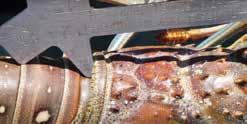
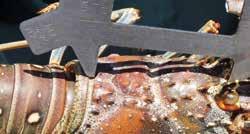
• Possession of bully nets or hoop nets are prohibited in Everglades National Park.
• Recreational harvesters are required to possess a valid Florida saltwater fishing license with current lobster addon. They can be purchased online at gooutdoorsflorida.com/ or by calling 1-888-HUNT-FLORIDA (486-8356).

• It is a felony to molest, damage or take lobster from commercial traps in state or federal waters.
• A diver-down flag must be prominently displayed when divers and snorkelers are in the water. Other vessels must slow to idle speed when within 300 feet of a dive flag in open water, or 100 feet in canals.
• It is illegal to intentionally create “artificial habitat” for lobsters using items like cement blocks, pipes and other debris.
• Recreational trapping is prohibited
Sport season/“mini season”: the last consecutive Wednesday and Thursday in July, beginning at 12:01 a.m. on day one and ending at midnight on day two. Regular season: August 6 through March 31
Most Keys cities have invoked special rules to cut down on neighbor-on-neighbor – and especially resident-on-visitor – “turf wars.” Essentially, local rules establish a “no-go” zone to keep lobster hunters away from private property. In the following areas, there is no diving or snorkeling within 300 feet of enhanced residential or commercial shoreline, any man-made or private canal, or any public or private marina:
In Islamorada, Key West and unincorporated Monroe County, the rule applies during the three days prior to the sport season (July 23-25 in 2023), the entirety of the sport season (July 26-27) and the first five days of the regular season (Aug. 6-10). In Marathon, the rule only applies during sport season, and in Key Colony Beach, it applies from the four days preceding sport season through 10 days after the opening of regular season. The city of Layton has a prohibition on harvesting lobster any time from waters within city limits.
DON’T GO THERE...
While there are many spots to catch a sizable lobster, there are also many areas protected by a special set of rules. Know where you’re going before you head out.
DON’T LOBSTER IN THESE AREAS
Sanctuary Preservation Areas (SPAs)
Upper Keys
Alligator Reef Carysfort Reef Cheeca Rocks
Conch Reef Davis Reef Elbow Reef
French Reef Grecian Reef Hen and Chickens
Key Largo Dry Rocks Molasses Reef
Middle Keys
Coffins Patch Sombrero Key
Lower Keys
Eastern Dry Rocks Looe Key Sand Key
Newfound Harbor Rock Key
Ecological reserves
Western Sambo Dry Tortugas
Special-use research only areas (no entry)
Conch Reef Tennessee Reef
Looe Key Patch Reef Eastern Sambo
Other closed areas (year-round)
• Everglades National Park
• Dry Tortugas National Park
• Biscayne Bay Card Sound Spiny Lobster Sanctuary

• City of Layton
• Artificial habitats in state waters
Other prohibitions during sport season
• John Pennekamp State Park, Key Largo
• Diving at night













